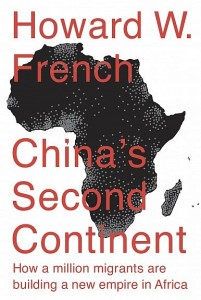 Jonathan Sullivan 14 Aug 2014
Jonathan Sullivan 14 Aug 2014
Written by Jonathan Sullivan.
Howard French (2014) China’s Second Continent. New York: Knopf.
Who are the Chinese in Africa? Why are they there? What are they doing? What effects are their actions and engagements with local populations having? These are important substantive questions that have somehow flown under the radar despite the growing abundance of academic research and the western media’s fascination with the China-Africa engagement. In answer, Howard French has produced an engaging, surprising and challenging account of his encounters with Chinese migrants across 11 African countries. French’s meticulously researched travelogue and empirical reportage is highly recommended as a companion to the academic literature and an invaluable stimulus for further research on the Chinese population in Africa.
French’s first achievement with this book is to demonstrate that there is no homogeneous bloc of Chinese in Africa and the phrase “the Chinese in Africa” is redundant and misleading. This finding confirms similar observations in the South Pacific, the Russian Far East and Central Asia and given French’s standing his book is a high profile corrective to many erroneous assumptions and stereotypes about “the Chinese”, which are at best unhelpful and at worst propagate racist tropes along the lines of the Yellow Peril. In reality the range of Chinese citizens residing in Africa—around one million according to best estimates—have to be broken down by provincial origin (Henan and Fujian are, as usual, particularly well represented), length of time in Africa (‘old hands’ are very different in their attitudes and behaviour than newcomers), by generation (the ‘lost generation’ of the Cultural Revolution have different expectations than twenty-somethings looking for adventure or to make it rich quick), by social status (peasants are as looked down on by Chinese of a different class in Africa as they are in the PRC) and by what they do (the full range of trades are represented). As with the Victorian colonialists, class, regional and other distinctions determine the temperature of interactions between Chinese compatriots. The homogenizing effect that Chinese restaurants and Chinese characters seem to have on receiving populations and foreign observers around the world belies the frequent lack of common feeling among Chinese in Africa. Contrary to the stereotype that “Chinese stick together,” French finds many settlers try to stay away from their compatriots—although this may say something about expat adventurers everywhere. French’s fieldwork nonetheless uncovers numerous shared motivations and experiences among Chinese residents in various African countries.
Simple economics underpins most migrations. It may surprise some readers that Chinese perceive in Africa an opportunity to make money; to carve out a niche that doesn’t exist in uber-competitive China. Many of French’s interlocutors could not see great opportunities for themselves in China and sought economic opportunities in Africa. Some will stay forever, others plan ultimately to return to China, but none of them are in Africa for the short term. Most came to Africa with no idea about what they would do there. Many of them, particularly the older hands, share self-narratives about enduring hardships, and personal images (consistent with CCP narratives of an earlier time) of the tough self-reliant frontiersman. The Chinese that French encountered also had ‘robust’ attitudes towards local people. Mostly they saw Africans entirely in racial terms: Not once does any of his many interlocutors refer to Africans or Ghanaians or Namibians or ‘the locals’. Africans are defined by their skin colour—blacks 黑人. The phrase does not have the same baggage that it would in English, and Chinese sometimes refer to themselves as ‘yellow people’ 黄种人. But it concretizes much stereotypical thinking along the lines of “the blacks have a poor work ethic”, “the blacks don’t know how to do business/manage an operation/feed themselves” etc. By contrast, Chinese “get-up-and-go” has long been mythologized by Diaspora communities to explain their relative economic success. The Chinese French encounters do likewise, and as in other parts of the world it is a cause of tension in locales where cultural and religious customs are different. French reports on Chinese incredulity, tinged with disgust, about businesses shutting down on Sunday’s for Christian worship. French gives short shrift to the “Chinese neo-colonialism” trope, although much of the thinking that his interviewees reveal to him is redolent of the racism and hypocrisy of the Victorian colonialists—the queasiness of sharing cutlery or towels does not preclude many of the men taking African lovers for instance.
